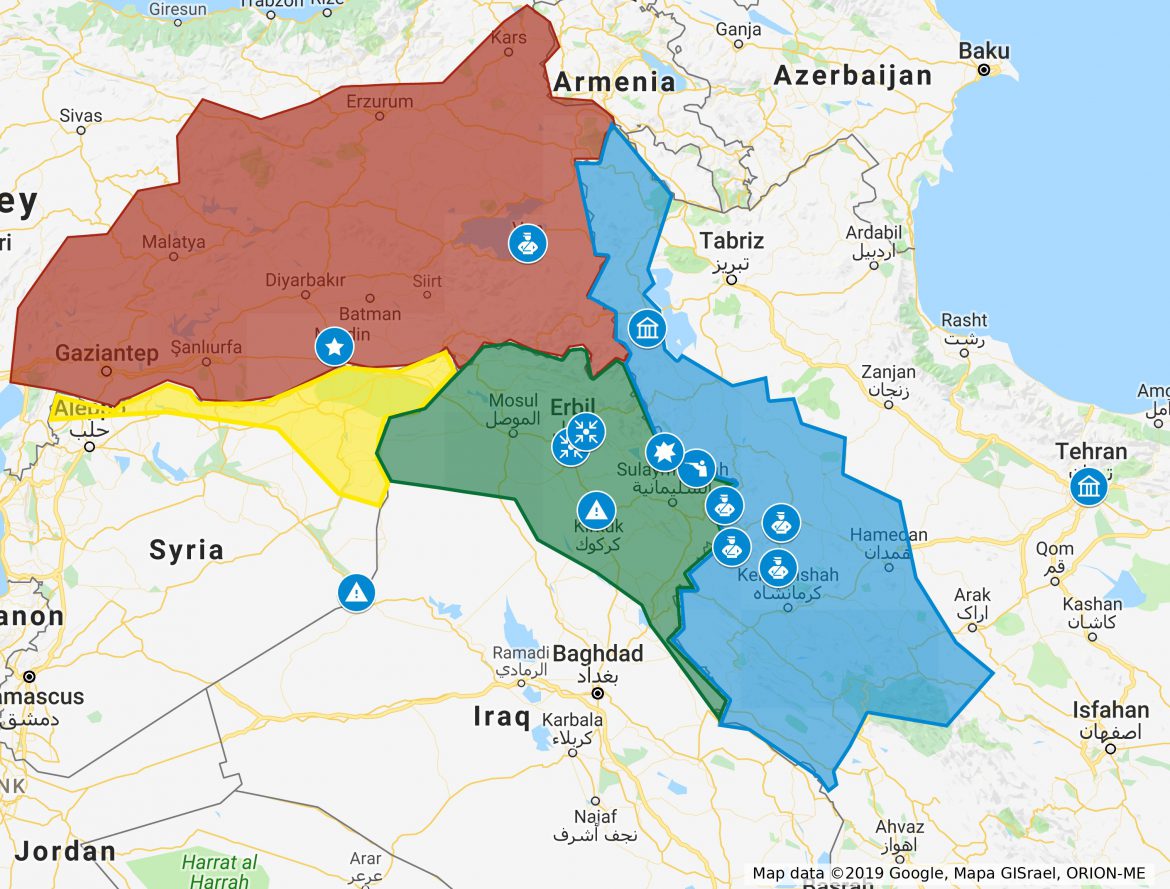1.1K
A weekly brief of events that occurred in the Kurdish regions of Iran, Iraq, Syria, and Turkey.
Iran
- After his detention in December of 2018, the Islamic Revolutionary Court of Tehran has sentenced the Kurdish activist Behnam Ibrahim Zada to 18 months in prison. Prior to his recent arrest, Zada spent five years in prison for his work on labor rights. Zada was charged for “activities against the national security” by the Iranian regime. In Urmia, the Islamic court sentenced another Kurdish activist Majeed Tibash to five years in prison for “connection with Kurdish opposition parties.” On Thursday, in Sanandaj, the Islamic court sentenced a Kurdish teacher, who is a civil activist, to one year in prison on charges of “posing threats to the national security.” Additional arrests by the Iranian intelligence office (Etellaa’t) last week include: a Kurdish activist, Poria Ahmadi, in Sanandaj; a Kurdish man, Farzad Husseini, in Kamyaran; and in Marivan city, a Kurdish man, Ayrej Rahimzada after raiding his house. According to the human rights group active in Iranian Kurdistan, the regime has arrested 63 Kurdish activists since the beginning of 2019.
- On Wednesday a Kurdish border porter, known as Kolbars, was wounded by direct shots from the Iranian border guards near Baneh. On Sunday, the Iranian security forces arrested six people in the Hawraman region near Pawa city, who are believed to be a group of Kolbars. The detainees were transferred to a jail in Nodasha town. On Sunday, the Iranian border guards blew up a bridge inside Iraqi Kurdistan near Pishdar that was used by the Kolbars to cross into the region.
Iraq
- After a deadlocked path between the Kurdistan Democratic Party (KDP) and the Patriotic Union of Kurdistan (PUK) to form the new government, the KDP is set to hold a new round of talks with the PUK this week. After PUK’s boycott of the Parliamentary session that resulted in the election of the Speakership, the KDP President advised the politico bureau to meet with the PUK for a new round of talks. The main dispute between the two parties is the Kirkuk province governorship and normalizing the situation of Kirkuk since it has been controlled by the Iranian backed militias and the Iraqi federal forces since October 16, 2017. On Tuesday the Kurdistan Parliament convened but the PUK will continue its boycott until reaching an agreement with the KDP.
- In Kirkuk, the Iraqi government formed a joint security command operation that includes the Iraqi army, the Iranian backed militias, and the Sunni militias without any Kurdish forces. While the talks continue between Baghdad and Erbil to include the Peshmerga forces in the operation and ensure their return to the disputed territories, no sign of such move has taken place yet. Meanwhile, the Iraqi government reduced the authority of the appointed governor Rakan Saed of Kirkuk, who has governed since October 2017. In a memorandum by the Iraqi Council of Ministers dated on January 29, the acting governor has been stripped of his authority to issue security permissions to oil tankers from Kirkuk. Since he took office, Saed faces several corruption allegations including spending public money without the approval of the Provincial Council.
- A U.S. delegation headed by the Special Presidential Envoy to the Special Envoy for the Global Coalition to Defeat ISIL James Jeffrey visited the Kurdistan region and held meetings with the President of the KDP Massoud Barzani and the Deputy Prime Minister Qubad Talabani in Erbil. Jeffrey was accompanied by the Deputy Assistant Secretary for Levante Joel Rayburn. The US. delegation talks also included Baghdad-Erbil relations.
Syria
- The Kurdish administration in Syria welcomed the decision by President Trump to keep 400 troops in the country. Meanwhile, hundreds of ISIS terrorist families surrendered to the U.S. backed Syrian Democratic Forces (SDF) after losing their final control of land in Bagouz town. ISIS terrorists released some civilians but continue to hold a number of prisoners. Among the civilians that were freed by the SDF were two Yazidi women and four children who were abducted by ISIS in 2014 in Shingal. Reports state that the SDF handed over hundreds of ISIS terrorists to the Iraqi government, including foreign terrorists who are wanted in Iraq for terror activities.
Turkey
- On February 24, the Turkish authorities released a renowned Kurdish painter Zehra Dogan after nearly three years of imprisonment. Dogan was jailed for painting Nusaybin city after it was destroyed by the Turkish military in 2015.
- More Hunger strikes were launched by Kurdish activists in Turkey and across Europe to end the isolation of the jailed Kurdish leader Abdullah Ocalan and other political prisoners. Meanwhile, the former lawmaker Leyla Guven continued her hunger strike for more than three months and her health remains in critical condition. The jailed Kurdish politician Selahattin Demirtas sent a letter to Parliamentary Assembly of the Council of Europe (PACE) regarding the hunger strikes. Demirtas warned that the hunger strikes “reached the borders of death.” He described the demands of those participating as “legitimate” and further, “a realistic one that can make concrete and direct contributions to the security, peace, and stability of Turkey, Syria and Europe.”
- In the most recent arrests against Kurds, 12 people from Van city and Baskale district of Van province were detained on Saturday after police raided their homes. The detainees have been taken to the anti-terror department of the police. Most of the detainees are members of the pro-Kurdish Peoples’ Democratic Party (HDP). The Turkish government has intensified its crackdown on the opposition groups in the country in the run up to the local elections scheduled for March 31.

